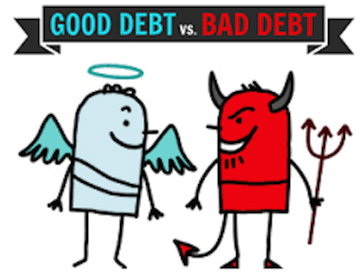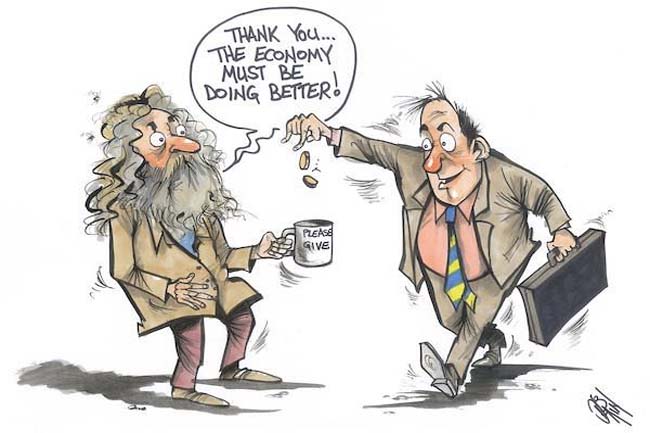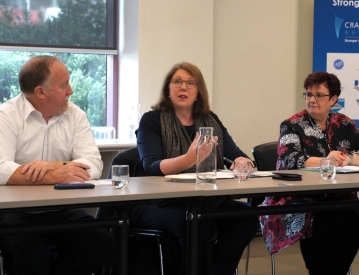'To add more private debt – and to add it to the young – is the height of folly ... We are in the grip of a mass delusion and we have been now for 30 years or more.'
~ Dr Steven Hail
IT IS DIFFICULT to identify the most ludicrous policy proposal to emerge from our politicians in recent times.
But an increase in our already high university fees, when in a smart country there should be no university tuition fees at all, or at most a token charge, is definitely on the short-list.
Slapped w higher $s,earlier pay back & yet no higher ed reform to create pathways to jobs & prosperity...go figure!@moir_alan#auspol #HECS pic.twitter.com/0MrhC3hQCw
— Holly Ransom (@HollyRansom) May 2, 2017
We have as much private debt as we do in Australia, largely because we don't have enough government liabilities — call them "government debt" if you must. And if we are to use the term "government debt" for something which is better thought of as a form of money – and is not debt in the conventional sense of the term at all in a country with a monetary system like ours – can we please dispense with all this nonsense about "good debt" and "bad debt"?
There is good government spending and less good government spending — for sure. Government spending involves the use of real resources in our economy and should always be for the public purpose. It can add to inflationary pressures in the economy, so must be limited in scale and carefully budgeted for. Moreover, enough taxes must be collected to keep a lid on inflation, dependent on the level of government and non-government spending, relative to our productive capacity as a nation.
But there is no such thing as a distinction between "good debt" and "bad debt". No apparent funding source can ever be tied to a specific type of expenditure or investment. To pretend otherwise is nonsense. Even if taxes and government borrowing did "pay for" government spending, the notion that a specific source of funding could be matched to a particular type of spending is nonsense. It is sometimes called "hypothecation" and everyone knows it to be nonsense.
If you understand how modern financial systems work in countries like Australia, however, the problem with Federal Treasurer Scott Morrison’s framing of his budgetary proposals is much more fundamental than a silly and essentially meaningless distinction between good and bad "debt". It is that every dollar of government spending or investment is, in reality, a new dollar being born — the monetary base literally increases every time the government spends a dollar. Every dollar of taxation marks the death of a dollar. Government bond sales (the issuance of "debt") are just a way to drain dollars from the banking system to support the current mechanism the Reserve Bank of Australia (RBA) has for controlling interest rates.
Good debt and bad debt. Is this creative accounting designed to hide the true extent of the debt, or simply common sense? #Insiders #auspol pic.twitter.com/CN4zXyId3I
— Insiders ABC (@InsidersABC) April 29, 2017
Good debt and bad debt (Source: @InsidersABC)
The Australian Government cannot ever run out of Australian dollars. Our current institutional arrangements may obscure this fact, somewhat, but it remains a fact. Government debt is better thought of as money. Government debt never has to be paid back. Government debt is not a burden on future generations, even when held by foreign investors.
A problem we have in Australia at the moment is that the fiscal deficit is too small to support the economy and there is insufficient government debt to meet the saving requirements of the private and foreign sectors. This is why we have so much unemployment, underemployment and insecure employment. This is why we have so much private debt and, in particular, household debt. This is part of the reason for our property bubble and our fragile financial system.
To add more private debt – and to add it to the young – is the height of folly, resulting from the mass delusion that the budget is broken and needs to be repaired, that the government can run out of its own currency, that government liabilities are in some way a burden on future generations (excuse me!) and that there is something inherently "good" about a budget surplus.
We are in the grip of a mass delusion and we have been now for 30 years or more.
The Coalition are deluded. The ALP are deluded. The Greens are deluded. Most micro-parties are deluded. Virtually all journalists are deluded — to an extraordinary degree. All orthodox economists are deluded and so are a few heterodox ones.
None of them understands the mechanics of monetary systems.
@johnharris1969 The left needs to radically rethink its approach to economics if it thinks full empnt impossible https://t.co/BRfJwlF5Ni
— Rob Beardmore (@robbeardmore7) February 18, 2017
We live in the Ptolemaic age where the government budget is concerned. We have invented the telescope and we can clearly show anyone who is prepared to look through it that the monetary system is not Ptolemaic.
Some haven't realised this.
Others have the same shock religious fundamentalists had with the idea that the Sun and the planets do not revolve around the Earth.
Shamefully, many people are at least partly aware of the insights of modern monetary theory and that these insights are based on fact but are ignoring all this for career-based, political or other reasons. They will often justify themselves by mentioning that great but pathetic excuse, the Overton Window.
All this garbage will collapse in the end and those shamefully ignoring the truth at the moment will be made to look at what they are, because the workings of a monetary system are simple enough at the level of fundamentals, so that anyone can understand them.
Meanwhile, prepare yourself for wall-to-wall garbage, from the Right but also from the Left, in the discourse relating to the 2017 Budget, in the days, weeks and months ahead.
You can read more by Dr Steven Hail at erablogdotcom, follow him on Twitter @StevenHailAus, as well as on Facebook at Green Modern Monetary Theory and Practice.
Steven Hail explains government debt (Source: Steven Hail)

This work is licensed under a Creative Commons Attribution-NonCommercial-NoDerivs 3.0 Australia License
Scott Morrison shows what he means by good debt bad debt#auspol #gooddebtbaddebt #nswpol pic.twitter.com/NQTRQ10uGC
— TwoEyeHead (@TwoEyeHead) April 28, 2017
Monthly Donation
Single Donation
Budget time: More pointless targets and less fiscal solutions, ScoMo style @StevenHailAus https://t.co/qrvU1KVFMI @IndependentAus
— Michelle Pini (@vmp9) April 11, 2017
It all adds up! Subscribe to IA for just $5











